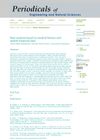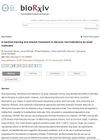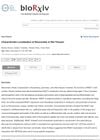 June 2020 in “bioRxiv (Cold Spring Harbor Laboratory)”
June 2020 in “bioRxiv (Cold Spring Harbor Laboratory)” 17α-estradiol extends lifespan and improves metabolism in male mice through the estrogen receptor α.
March 2020 in “bioRxiv (Cold Spring Harbor Laboratory)” Health issues in retired breeder guinea pigs don't affect experiment success.
 January 2020 in “bioRxiv (Cold Spring Harbor Laboratory)”
January 2020 in “bioRxiv (Cold Spring Harbor Laboratory)” Certain genetic variants in ERN1, TACR3, and SPPL2C are linked to when Alzheimer's disease starts.
 December 2019 in “Periodicals of Engineering and Natural Sciences (PEN)”
December 2019 in “Periodicals of Engineering and Natural Sciences (PEN)” Hair analysis can provide insights into a person's medical history and location over time.
 August 2019 in “bioRxiv (Cold Spring Harbor Laboratory)”
August 2019 in “bioRxiv (Cold Spring Harbor Laboratory)” The model successfully predicted new uses for existing drugs, like using certain hormonal and heart medications for respiratory and Parkinson's diseases, and a cancer drug for diabetes.
 July 2019 in “bioRxiv (Cold Spring Harbor Laboratory)”
July 2019 in “bioRxiv (Cold Spring Harbor Laboratory)” Kashmiri women with PCOS have more Bifidobacterium in their gut.
 October 2018 in “bioRxiv (Cold Spring Harbor Laboratory)”
October 2018 in “bioRxiv (Cold Spring Harbor Laboratory)” Neuronatin is found in various cells of rat tissues and has a unique location in sperm cells.
 December 2017 in “bioRxiv (Cold Spring Harbor Laboratory)”
December 2017 in “bioRxiv (Cold Spring Harbor Laboratory)” Endoglin is important for proper hair growth cycles and stem cell activation in hair follicles.
January 2016 in “Xumu Shouyi Xuebao” January 2015 in “Journal of cosmetics, dermatological sciences and applications” The combined technology safely and effectively removes hair at home on dark skin.
April 2023 in “Journal of Investigative Dermatology” The MDhair app accurately assesses hair loss severity with 94% accuracy.
November 2022 in “Cureus” New biomaterial treatments for baldness show promise, with options depending on patient needs.
December 2021 in “Acta dermato-venereologica” A deep learning model accurately predicts male hair loss types using scalp images.
Myeloid cells can turn into skin and hair cells to help heal wounds.
November 2021 in “Frontiers in Genetics” The FAW-FS algorithm improves depression recognition, and psychological interventions help AGA patients' mental health.
April 2021 in “bioRxiv (Cold Spring Harbor Laboratory)” September 2020 in “bioRxiv (Cold Spring Harbor Laboratory)” Finasteride may help reduce opioid use.
323 citations,
November 2017 in “Bioanalysis” Matrix effects in LC-MS can be managed but not completely avoided.
103 citations,
December 2021 in “Journal of biological rhythms” Shift work disrupts the body's natural clock, leading to health problems.
92 citations,
September 2013 in “Journal of Investigative Dermatology” BMAL1 and Period1 genes can influence human hair growth.
68 citations,
March 2019 in “Journal of Cranio-Maxillofacial Surgery” The facial aging scale is a reliable tool for assessing skin aging and treatment effects.
64 citations,
January 2009 in “The International journal of developmental biology” Hair follicle stem cells are controlled by their surrounding environment.
 57 citations,
June 2021 in “Science”
57 citations,
June 2021 in “Science” Women inventors focus more on women's health, but there are few of them.
50 citations,
April 2010 in “Biology direct” Low androgen levels might delay prostate cancer but could lead to more aggressive, therapy-resistant cancers.
 45 citations,
August 2018 in “Stem Cells International”
45 citations,
August 2018 in “Stem Cells International” Stem cells, especially from fat tissue and Wharton's jelly, can potentially regenerate hair follicles and treat hair loss, but more research is needed to perfect the treatment.
42 citations,
July 2017 in “Molecular therapy” A form of vitamin E promotes hair growth by activating a specific skin pathway.
40 citations,
September 2019 in “World journal of clinical cases” An elderly man's hair grew back after a treatment that transferred healthy gut bacteria.
38 citations,
July 2020 in “EMBO journal” SIRT7 protein is crucial for starting hair growth in mice.









